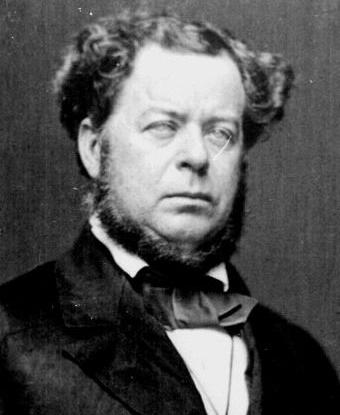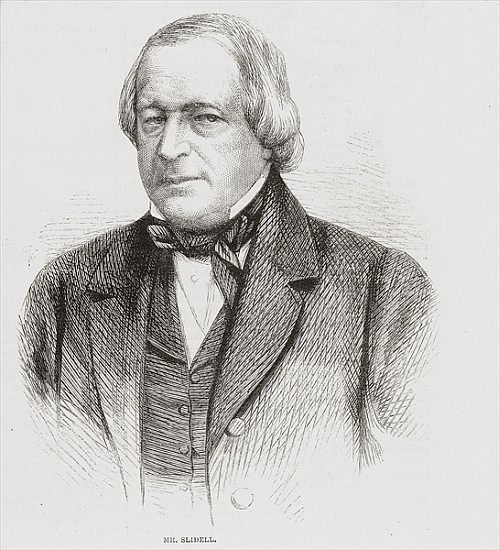 |
| Secretary
of War Joseph Holt |
 . . |
| Mississippi Senator Benjamin Fitzpatrick |
 |
| Florida Senator Stephen R. Mallory |
 |
| Louisiana Senator John Slidell |
|
The first thing that should occur to the reader here is that all three of the men receiving this letter were no longer United States Senators---they had already resigned, two of them just the day before! Regardless of that "minor technicality," these men had been discussing South Carolina's potential actions regarding Fort Sumter with Commissioner Isaac Hayne, trying to keep the South Carolinians from opening hostilities prematurely. | ||||||||
|
|
|
|||||||
|
WAR DEPARTMENT
Washington, January 22, 1861. Hon. BENJAMIN FITZPATRICK, GENTLEMEN: The President has
received your communication of the 19th instant, with the copy of a
correspondence between yourselves and others, “representing States which have
already seceded from the United States, or will have done so before 1st of
February next,” and Col. Isaac W. Hayne, of South Carolina, in behalf of the
government of that State, in relation to Fort Sumter, and you ask the President
“to take into consideration the subject of the correspondence.” With this request he has complied, and has
directed me to communicate his answer. In your letter to Colonel Hayne
of the 15th instant, you propose to him to defer the delivery of a message from
the governor of South Carolina to the President, with which he has been
intrusted, for a few days, until the President and Colonel Hayne shall have
considered the suggestions which you submit. It is unnecessary to refer
specially to these suggestions, because the letter addressed to you by Colonel
Hayne, of the 17th instant, presents clear and specific answer to them. In this
he says: “I am not clothed with power to make the arrangement you suggest, but
provided you can get assurances with which you are entirely satisfied that no
re-enforcements will be sent to Fort Sumter in the interval, and that the
public peace will not be disturbed by any act of hostility toward South
Carolina, I will refer your communication to the authorities of South Carolina,
and withholding the communication with which I am at present charged, will
await further instructions.” From the beginning of the present
unhappy troubles, the President has endeavored to perform his executive duties
in such a manner as to preserve the peace of the country and prevent bloodshed.
This is still his fixed purpose. You,
therefore, do him no more than justice in stating that you have assurances
(from his public messages, I presume) that, “notwithstanding the circumstances
under which Major Anderson left Fort Moultrie and entered Fort Sumter with the
forces under his command, it was not taken, and is not held, with any hostile
or unfriendly purpose towards your State, but merely as property of the United
States, which the President deems it his duty to protect and preserve.” You have correctly stated what the President
deems to be his duty. His sole object
now is, and has been, to act strictly on the defensive, and to authorize no
movement against the people of South Carolina unless clearly justified by a
hostile movement on their part. He could
not have given a better proof of his desire to prevent the effusion of blood
than by forbearing to resort to the use of force under the strong provocation
of an attack (happily without a fatal result) on an unarmed vessel bearing the
flag of the United States. I am happy to observe that in
your letter to Colonel Hayne you express the opinion that it is “especially due
from South Carolina to our States, to say nothing of other slaveholding States,
that she should, as far as she can consistently with her honor, avoid
initiating hostilities between her and the United States, or any other power.”
To initiate such hostilities against Fort Sumter would, beyond question, be an
act of war against the United States. In regard to the proposition of
Colonel Hayne, “that no re-enforcements will be sent to Fort Sumter in the
interval, and that the public peace will not be disturbed by any act of
hostility towards South Carolina,” it is impossible for me to give you any such
assurances. The President has no
authority to enter into such an agreement or understanding. As an executive officer he is simply bound to
protect the public property so far as this may be practicable, and it would be
a manifest violation of his duty to place himself under engagements that he
would not perform this duty either for an indefinite or limited period. At the
present moment it is not deemed necessary to re-enforce Major Anderson, because
he makes no such request, and feels quite secure in his position. Should his
safety, however, require re-enforcements, every effort will be made to supply
them. In regard to an assurance from
the President “that the public peace will not be disturbed by any act of
hostility toward South Carolina,” the answer will readily occur to yourselves. To Congress, and to Congress alone, belongs
the power to make war, and it would be an act of usurpation for the Executive
to give any assurance that Congress would not exercise this power, however
strongly he may be convinced that no such intention exists. I am glad to be assured from the
letter of Colonel Hayne that “Major Anderson and his command do now obtain all
necessary supplies, including fresh meat and vegetables, and, I believe, fuel
and water, from the city of Charleston, and do now enjoy communication by post
and special messenger with the President, and will continue to do so, certainly
until the door to negotiation has been closed” I trust that these facilities may still be
afforded to Major Anderson. This is as
it should be. Major Anderson is not
menacing Charleston, and I am convinced that the happiest result which can be
attained is that both he and the authorities of South Carolina shall remain on
their present amicable footing, neither party being bound by any obligation
whatever, except the high Christian and moral duty to keep the peace, and to
avoid all causes of mutual irritation. Very respectfully, your obedient servant, J. HOLT, Secretary of War. |
Back to Civil War Chronologies (Main page) Back to Chronology of the Fort Sumter Crisis Source: Official Records, Vol. 1, pp. 149--50. Date added to website: January 8, 2025. |